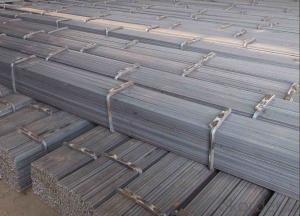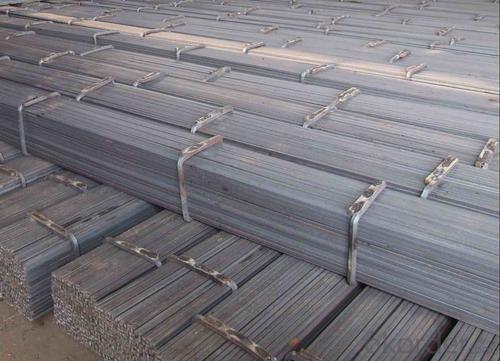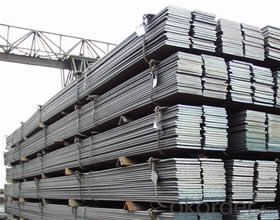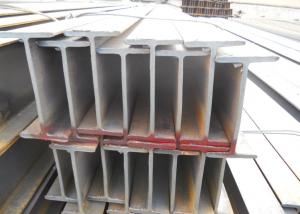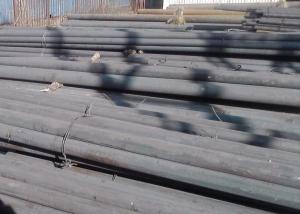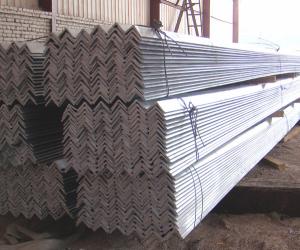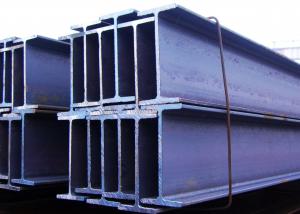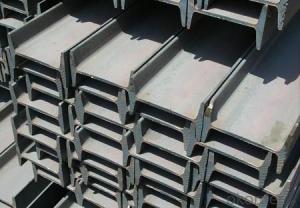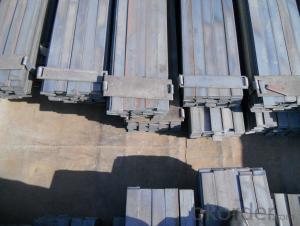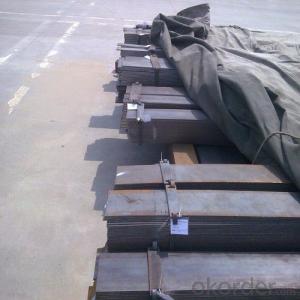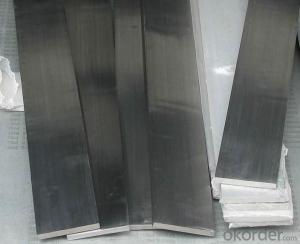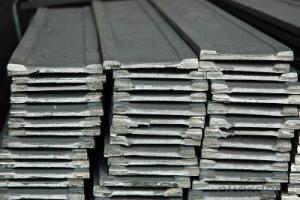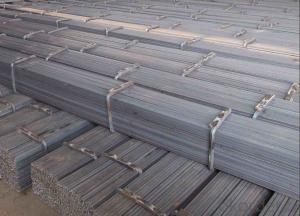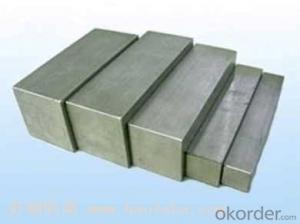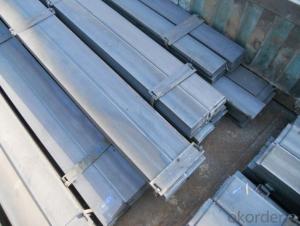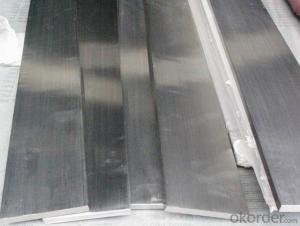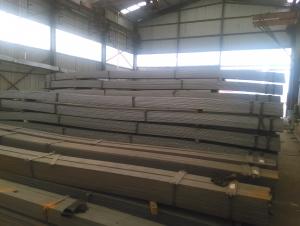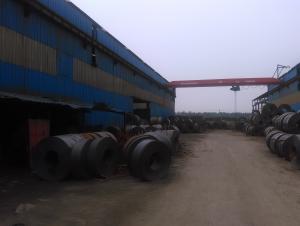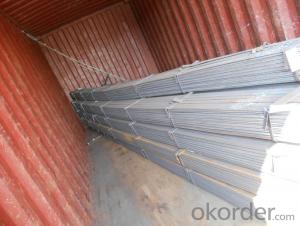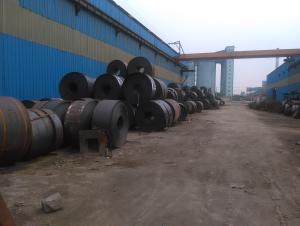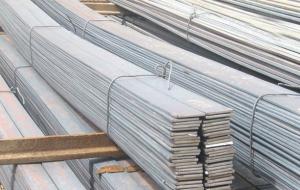high quality flat bar GB Q235 or wide falt bar
- Loading Port:
- Tianjin
- Payment Terms:
- TT OR LC
- Min Order Qty:
- 25 m.t.
- Supply Capability:
- 20000 m.t./month
OKorder Service Pledge
OKorder Financial Service
You Might Also Like
lat bar Details:
| Minimum Order Quantity: | Unit: | m.t. | Loading Port: | ||
| Supply Ability: | 10000 | Payment Terms: | Package: | Steel Packing |
Product Description:
Product Description:
Specification of Mild Steel Flat Bar
Commodity: Mild Steel Flat Bar
Standard: GB;JIS
Material: Q195-235;SS400
Brand name: FLATSPACE
Origin place: China
Thickness: 3mm-30mm
Width:20mm-200mm
Length: Max 12m
Certification: SGS/BV
Chemical composition of Q235
Alloy No | Grade | Element(%) | ||||
C | Mn | S | P | Si | ||
Q235 | B | 0.12—0.20 | 0.3—0.7 | ≤0.045 | ≤0.045 | ≤0.3 |
Physical properties of Q235
Alloy No | Grade | Yielding strength point(Mpa) | Tensile strength (Mpa) | Elongation after fracture(%) | ||||||
Thickness (mm) | Thickness (mm) | |||||||||
≤16 | >16--40 | >40--60 | >60--100 | ≤16 | >16--40 | >40--60 | >60--100 | |||
≥ | ≥ | |||||||||
Q235 | B | 235 | 225 | 215 | 205 | 375--500 | 26 | 25 | 24 | 23 |
Usage/Applications of Mild Steel Flat Bar
Widely used for construction, Machinery manufacturing, Iron tower steel structure, Shipbuilding; Steel grating, Staircase, Bridge, Viaduct, Railway spare parts, Boilers making etc.
Packaging & Delivery of Mild Steel Flat Bar
Packaging Details: The Mild Steel Flat Bars are packed in bundles and loaded in 20 feet/40 feet container, or shipped by bulk cargo ,also we can do as customer's requirements.
Delivery Details:30~45 days upon the receipt of buyer payment by T.T. or L/C.
Production Flow of Mild Steel Flat Bar
The Mild steel flat bar is made through three processes:
1.Feeding the material: Feeding the row material (the steel plate) to Slitting Line.
2.Slitting:The steel plate would be slitted into expected width by lengthways cutter.
3. Leveled and cutting: The plat bar would be ground into level by the grinder and then cut into required length
- Q: How do steel flat bars compare to wood for certain applications?
- Steel flat bars have several advantages over wood for certain applications. Firstly, steel flat bars are much stronger and more durable than wood, making them ideal for heavy-duty applications that require a high level of strength and stability. Additionally, steel flat bars are not susceptible to rot, decay, or insect damage like wood, making them a more long-lasting option. Moreover, steel flat bars are fire-resistant, making them safer in environments where fire hazards are a concern. Finally, steel flat bars can be easily shaped and manipulated, allowing for greater design flexibility compared to wood. Overall, steel flat bars offer superior strength, durability, and safety benefits, making them a preferred choice for many applications.
- Q: Can steel flat bars be used for shelving or storage systems?
- Yes, steel flat bars can be used for shelving or storage systems. Steel flat bars are strong and durable, making them a suitable choice for supporting heavy loads on shelves or in storage units. They can be easily cut and welded to create custom shelving configurations and can withstand the weight of various items. Additionally, steel flat bars have a sleek and modern appearance, making them a popular choice for industrial or contemporary storage systems.
- Q: How do steel flat bars compare to ceramic flat bars?
- Steel flat bars and ceramic flat bars have different properties and characteristics that make them suitable for different applications. Steel flat bars are known for their strength and durability. They are made from a combination of iron and carbon, which gives them a high tensile strength. This makes steel flat bars ideal for heavy-duty applications that require a lot of strength, such as construction, manufacturing, and automotive industries. Steel flat bars are also resistant to impact, making them less likely to break or crack under pressure. Additionally, steel flat bars can be easily welded and manipulated, allowing for versatility in their usage. On the other hand, ceramic flat bars are known for their heat resistance and low friction properties. Ceramic flat bars are made from non-metallic materials, such as clay or porcelain, that are fired at high temperatures. This makes them excellent for applications that require resistance to high temperatures, such as furnace linings or kiln furniture. Ceramic flat bars also have low friction properties, making them suitable for applications where reducing friction is essential, such as in bearings or cutting tools. In terms of appearance, steel flat bars have a metallic and industrial look, while ceramic flat bars have a more refined and elegant appearance. This aesthetic difference may be a factor in choosing between the two types of flat bars, depending on the desired visual impact of the application. In summary, steel flat bars are favored for their strength, durability, and versatility, making them suitable for heavy-duty applications. Ceramic flat bars, on the other hand, are valued for their heat resistance and low friction properties, making them ideal for applications where these characteristics are required. The choice between steel and ceramic flat bars ultimately depends on the specific needs and requirements of the application at hand.
- Q: Can steel flat bars be used in the manufacturing of automotive parts?
- The utilization of steel flat bars in the production of automotive parts is indeed possible. In the automotive industry, steel flat bars are frequently employed owing to their exceptional strength and durability. They possess the capacity to be molded, trimmed, and fused together to fulfill the distinct demands of various automotive components, including brackets, frames, supports, and reinforcements. Furthermore, steel flat bars can undergo diverse surface treatments, like galvanization or powder coating, to augment their resistance to corrosion and improve their visual appeal. All in all, steel flat bars constitute a versatile and dependable material option for the manufacturing of automotive parts.
- Q: Can steel flat bars be used for making storage racks?
- Yes, steel flat bars can be used for making storage racks. Steel flat bars are strong and durable, making them suitable for supporting heavy loads in storage rack structures.
- Q: Are steel flat bars easy to work with?
- Yes, steel flat bars are generally considered to be easy to work with. They are versatile and can be easily cut, drilled, welded, and shaped to fit various applications. Steel flat bars have a uniform shape and are available in a range of thicknesses, widths, and lengths, making them suitable for a wide range of projects. Additionally, they have good strength and durability, making them a popular choice in construction, manufacturing, and DIY projects. However, it is important to note that working with steel flat bars may require certain tools and skills, and precautions should be taken to ensure safety.
- Q: What are the advantages of using steel flat bars in construction?
- There are several advantages of using steel flat bars in construction. Firstly, steel flat bars offer exceptional strength and durability, making them suitable for supporting heavy loads and withstanding harsh weather conditions. Secondly, steel flat bars are highly versatile and can be easily shaped and manipulated to fit various construction requirements, allowing for greater design flexibility. Additionally, steel flat bars have excellent fire resistance properties, providing increased safety in case of a fire. Lastly, steel is a sustainable and recyclable material, making it an environmentally friendly choice for construction projects.
- Q: Can steel flat bars be used for making food processing equipment?
- No, steel flat bars are not suitable for making food processing equipment as they can corrode and contaminate the food. Stainless steel or food-grade materials are typically used for food processing equipment to ensure safety and hygiene.
- Q: How do steel flat bars contribute to the overall sustainability of infrastructure projects?
- Steel flat bars contribute to the overall sustainability of infrastructure projects in several ways. Firstly, they are durable and long-lasting, which means they require minimal maintenance and replacement over time, reducing the need for additional resources. Secondly, steel is a highly recyclable material, so at the end of its lifespan, flat bars can be recycled and reused in other projects, reducing waste and conserving natural resources. Additionally, steel flat bars have a high strength-to-weight ratio, meaning they can support heavy loads while requiring less material, which helps to reduce the overall carbon footprint of infrastructure projects.
- Q: Galvanized steel flat welding occurs after the material itself crack.
- Thermal cracking: most of the material being welded is alloy, and the solidification of the alloy starts from the beginning to the end, which is carried out in a certain range, which is the basic cause of the thermal crack.
Send your message to us
high quality flat bar GB Q235 or wide falt bar
- Loading Port:
- Tianjin
- Payment Terms:
- TT OR LC
- Min Order Qty:
- 25 m.t.
- Supply Capability:
- 20000 m.t./month
OKorder Service Pledge
OKorder Financial Service
Similar products
Hot products
Hot Searches
Related keywords
